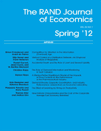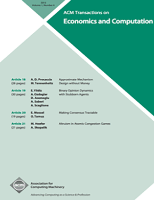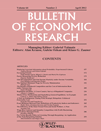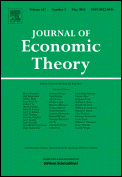
Economic Theory Bulletin
metrics 2024
Cultivating a vibrant community of economic theorists and practitioners.
Introduction
Welcome to the Economic Theory Bulletin, a premier journal dedicated to advancing the field of economic theory. Published by SPRINGER HEIDELBERG, this journal serves as a critical platform for researchers and professionals to disseminate innovative ideas and research findings that shape economic discourse. With an ISSN of 2196-1085 and an E-ISSN of 2196-1093, the Economic Theory Bulletin invites contributions that address theoretical advancements and empirical applications in economics, fostering insightful dialogue among scholars. Although the journal operates under a traditional access model, it remains committed to high-quality, peer-reviewed scholarship that meets the rigorous standards of the academic community. The diverse range of articles published here not only contributes to the theoretical foundations of economics but also emphasizes real-world applications, making it an essential resource for students and professionals alike. The journal’s impact on the evolving landscape of economic theory ensures that it remains a vital reference point for the latest research and trends in the field.
Metrics 2024
 -
- 0.40
0.40 0.30
0.30 -
-Metrics History
Rank 2024
IF (Web Of Science)
JCI (Web Of Science)
Quartile History
Similar Journals

THEORY AND DECISION
Exploring the Intersection of Theory and Practical Decision-MakingTHEORY AND DECISION is a prestigious academic journal published by SPRINGER, which has been a cornerstone of interdisciplinary research since its inception in 1970. With an ISSN of 0040-5833 and an E-ISSN of 1573-7187, this journal offers valuable insights into a range of fields, including Applied Psychology, Decision Sciences, Economics, and more. Holding a remarkable position within various quartile rankings, such as Q1 in Arts and Humanities and Q2 in Economics, it signifies the journal's impact and relevance in modern academic discourse. Although not presently open access, it remains accessible to researchers and institutions that prioritize impactful studies and theoretical advancements. The journal's objectives include exploring decision-making processes and theoretical underpinnings that inform practical applications across disciplines, making it an essential resource for academics, professionals, and students dedicated to advancing knowledge in their respective fields. THEORY AND DECISION continues to shape the landscape of interdisciplinary research, providing a platform for innovative ideas and discussions that are crucial in today’s complex world.

INTERNATIONAL JOURNAL OF GAME THEORY
Navigating the Landscape of Game TheoryINTERNATIONAL JOURNAL OF GAME THEORY, published by Springer Heidelberg, is a distinguished journal dedicated to the rigorous exploration of game theory across multiple disciplines, encompassing economics, mathematics, social sciences, and statistics. Established in 1971, this journal has become a pivotal resource for scholars and practitioners seeking to deepen their understanding of strategic interactions and decision-making processes. With ISSN 0020-7276 and E-ISSN 1432-1270, the journal spans its focus on theoretical advancements and practical applications in game theory. The journal currently ranks in the Q2 and Q3 quartiles across various categories, reflecting its impact and relevance in the academic community. Although not an open-access journal, it continues to provide invaluable insights for researchers, professionals, and students aiming to advance their knowledge in this critical area of study. The journal's commitment to fostering intellectual discourse is evident through its comprehensive coverage of topics relevant to modern-day challenges, positioning itself as an essential platform in the academic landscape.

ECONOMIC THEORY
Exploring the Depths of Economic UnderstandingECONOMIC THEORY is a leading academic journal published by Springer, dedicated to advancing the field of economics through the dissemination of innovative and high-quality research. Established in 1991, this journal has become a crucial resource for researchers, professionals, and students interested in theoretical economics and econometrics. With a strong reputation, it ranks in the Q1 category for Economics and Econometrics as of 2023, exemplifying its influence and contribution to the discourse in the field. The journal operates without Open Access options, ensuring that all published content undergoes rigorous peer-review, maintaining scholarly integrity. Scholars can access the journal's rich compendium of articles that delve into diverse economic theories, providing invaluable insights and fostering academic dialogue. Headquartered in Germany, ECONOMIC THEORY is committed to shaping the future of economic research and serving as a cornerstone in the academic community.

ACM SIGecom Exchanges
Connecting Ideas, Driving Innovations in EconomicsACM SIGecom Exchanges is a leading journal within the field of economics and computation, published by the Association for Computing Machinery (ACM). This esteemed publication serves as a valuable resource for researchers, professionals, and students alike, focusing on the intersection of economic theory and computational methods. Aiming to foster dialogue and collaboration in this increasingly important arena, ACM SIGecom Exchanges provides an open forum for innovative research, theoretical advancements, and practical applications. While specific metrics such as impact factors and HIndex may not be available at this time, the journal's commitment to quality and influence in the field is unquestionable. The journal is accessible for contributors and readers, ensuring that cutting-edge findings and insightful discussions are readily available within the academic community. Join the conversation and explore the evolving landscape of economics and computation through ACM SIGecom Exchanges, where knowledge meets innovation.

American Economic Journal-Economic Policy
Advancing Economic Insights for Tomorrow's ChallengesAmerican Economic Journal - Economic Policy, published by the American Economic Association, stands at the forefront of economic research, focusing on significant policy implications and evidence-based evaluations. With an ISSN of 1945-7731 and an E-ISSN of 1945-774X, this esteemed journal has maintained its influence and credibility in the field since its inception in 2009. Ranked in the Q1 category for Economics, Econometrics and Finance and ranking #7 out of 288 in Scopus, it boasts a remarkable 97th percentile ranking, making it a premier source for cutting-edge research and policy discussion. The journal's rigorous peer-reviewed articles aim to bridge the gap between academic research and real-world economic policy, serving as an essential resource for researchers, professionals, and students who seek to engage with and contribute to the evolving landscape of economic policy. With open access options not currently available, readers are encouraged to subscribe or access articles through academic institutions for comprehensive insights into the economic challenges and innovations shaping our world.

RAND JOURNAL OF ECONOMICS
Advancing Economic Understanding Through Rigorous AnalysisRAND JOURNAL OF ECONOMICS, published by Wiley, is a prestigious peer-reviewed journal that has been a cornerstone in the field of economics since its inception in 1984. With a focus on empirical and theoretical research, it aims to bridge the gap between economic theory and real-world application, providing insights that are both rigorous and relevant. The journal holds an impressive Q1 ranking in Economics and Econometrics, reflecting its significant impact and influence in the field, evidenced by its Scopus rank of #199 out of 716 in related categories. Although it does not offer open access, the journal remains accessible to a broad audience through institutional subscriptions. Researchers, professionals, and students will find RAND JOURNAL OF ECONOMICS an invaluable resource for cutting-edge economic analyses and a vital platform for scholarly dialogue about contemporary economic issues.

ACM Transactions on Economics and Computation
Advancing Knowledge at the Nexus of Economics and ComputationACM Transactions on Economics and Computation, published by the Association for Computing Machinery, is a premier scholarly journal that bridges the fields of economics and computation. With an ISSN of 2167-8375 and an E-ISSN of 2167-8383, this journal has carved out a significant niche since its inception in 2013, and is set to run through 2024. Its multidisciplinary scope encompasses various quarters, being ranked Q1 in Computer Science (miscellaneous) and Q2 in Computational Mathematics, Economics and Econometrics, Marketing, and Statistics and Probability as of 2023. The journal not only ranks impressively in Scopus—positioned within the top 25% for several categories—but also fosters a collaborative environment where researchers, professionals, and students can engage with cutting-edge research that showcases innovative methodologies and theoretical advancements. Although it is not open access, the journal remains vital for advancing knowledge at the intersection of computation and economics, making it an essential resource for those looking to understand the complexities of these dynamic fields.

BULLETIN OF ECONOMIC RESEARCH
Advancing Knowledge in Economics and EconometricsBULLETIN OF ECONOMIC RESEARCH is a premier academic journal published by WILEY, dedicated to the dissemination of high-quality research in the field of economics and econometrics. Established in 1948, the journal has a rich history of contributing to the scholarly dialogue surrounding economic theory and practice, making it an essential resource for researchers, professionals, and students alike. With an impressive impact factor and ranked in the Q3 category for 2023, the journal publishes original research articles, reviews, and theoretical discussions that reflect current trends and developments in the field. Despite not being an open-access journal, it offers numerous access options through institutional subscriptions, ensuring wide dissemination of its impactful content. Aiming to foster a deeper understanding of economic issues, the BULLETIN OF ECONOMIC RESEARCH serves as a vital platform for ongoing scholarly debate and innovation in economic thought.

JOURNAL OF ECONOMIC THEORY
Shaping Tomorrow’s Economic Theories TodayThe JOURNAL OF ECONOMIC THEORY, published by Academic Press Inc Elsevier Science, stands as a paramount platform for disseminating groundbreaking research within the field of economics and econometrics. With an impressive history dating back to 1969 and a convergence period extending to 2024, this journal has continually shaped the academic discourse around critical economic theories and methodologies. Currently recognized in the top quartile (Q1) of its category for 2023, it ranks prominently among its peers, boasting an impactful scholarly contribution reflected in its Scopus ranking—positioned at #348 out of 716 journals in the domain. Although it does not offer Open Access, the journal provides an essential resource for those seeking to enhance their understanding of complex economic models and strategies. Researchers, professionals, and students alike will find the JOURNAL OF ECONOMIC THEORY to be an invaluable asset for their academic and professional pursuits in the rapidly evolving landscape of economics.

Dynamic Games and Applications
Fostering Collaboration in Applied Mathematics ResearchDynamic Games and Applications (ISSN: 2153-0785, E-ISSN: 2153-0793) is a premier journal published by SPRINGER BIRKHAUSER that specializes in the field of applied and computational mathematics. With a notable impact factor and a solid standing within the Q2 quartile in several categories including Applied Mathematics and Computational Theory, this journal serves as a vital platform for researchers and practitioners looking to explore dynamic games and their applications across diverse disciplines. Covering a wide range of subjects from computer graphics and economics to advanced statistical methods, Dynamic Games and Applications seeks to publish original research that deepens the understanding of strategies in competitive and cooperative environments. As a crucial resource for academics, industry professionals, and graduate students, the journal not only disseminates innovative findings but also fosters collaboration and interdisciplinary research in an increasingly complex mathematical landscape.